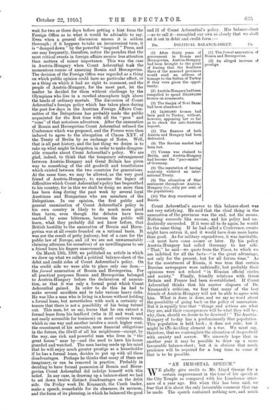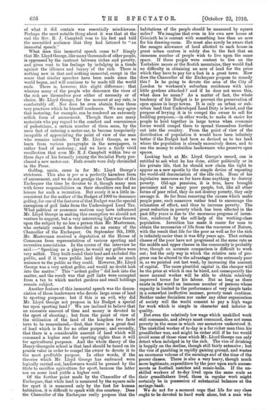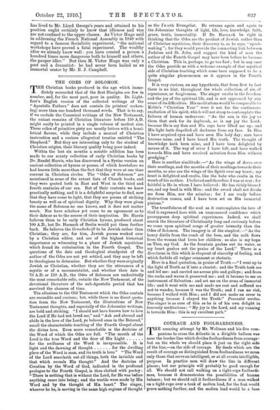" AN IMMORTAL SPEECH."
WE gladly give credit to Mr. Lloyd George for a certain improvement in the tone of his speech at the City Temple as compared with his Limehouse utter- ance of a year ago. But when this has been said, we fear that it is about the only favourable comment that can be made. The speech contained nothing new, and much of what it did. contain was essentially mischievous. Perhaps the most notable thing about it was that at the end the Rev. R. J. Campbell rose to his feet and told the assembled audience that they had listened to " an immortal speech." What does this immortal speech come to ? Simply that Mr. Lloyd George, like many thousands of other people, is oppressed by the contrast between riches and poverty, and gives vent to his feelings by indulging in a tirade against the idleness and luxury of the rich. There is nothing new in that and nothing immortal, except in the sense that similar speeches have been made since the world began, and will continue to be made till the world ends. There is, however, this slight difference : that whereas many of the people who denounce the vices of the rich are themselves poor either of necessity or of choice, Mr. Lloyd George, for the moment at any rate, is comfortably off. Nor does he even abstain from those very practices which he himself condemns. We may agree that motoring, for example, can be rendered an extremely - selfish form of amusement. Though there are many motorists who pay regard to the comfort and convenience of pedestrians, a certain number of them seem, by the mere fact of entering a motor-car, to become temporarily incapable of appreciating the point of view of the man who remains outside. °Yet Mr. Lloyd George, as we learn from various paragraphs in the newspapers, is rather fond of motoring ; and we have a fairly vivid. recollection that even Mr. R. J. Campbell within two or three days of his formally joining the Socialist Party pur- chased a new motor-car. Both events were duly chronicled in the Press.
Golfing, again, came in for -Mr. Lloyd George's strictures. This also is per se a perfectly harmless form of amusement, and we do not grudge the Chancellor of the Exchequer the time he devotes to it, though many men with fewer responsibilities on their shoulders can find no leisure for such a recreation. But surely it is a little in- consistent for the author of the Budget of 1909 to denounce golfing, for one of the features of that Budget was the special exemption of golf links from the Undeveloped Land Tax. What political or economic motives may have influenced Mr. Lloyd George in making this exemption we should not venture to suggest, but a very interesting light was thrown upon the subject by no less a person than Mr. Masterman, who certainly cannot be described as an enemy of the Chancellor of the Exchequer. On September 9th, 1909, Mr. Masterman received a deputation at the House of Commons from representatives of various sporting and recreative associations. In the course of the interview he said :—" Speaking as a player, he would say golfers were very selfish. They built round their land and excluded the public, and if it were public land they made as much nuisance to the public as they could. However, Mr. Lloyd George was a very ardent golfer, and would no doubt look into the matter.' This " ardent golfer " did look into the matter, and the result was that golf links were exempted from a tax to which market gardens and small holdings remain subject. Another feature of this immortal speech was the denun- ciation of those landowners who devote large areas of land to sporting purposes ; but if this is an evil, why did Mr. Lloyd George not propose in his Budget a special tax upon sporting land ? We are inclined to believe that an excessive amount of time and money is devoted to the sport of shooting ; but from the point of view of the utilisation of the land of the kingdom two facts have to be remembered,—first, that there is a great deal of land which is fit for no other purpose; and secondly, that there is a considerable amount of land which will command a higher rent for sporting rights than it will for agricultural purposes. And the whole theory of the Henry-Georgeite school is that land should be taxed on its prairie value in order to compel the owner to devote it to the most profitable purpose. In other words, if the theories which Mr. Lloyd George has embraced were logically carried out; landowners would be pressed. by the State to sacrifice agriculture for sport, because the latter Use on some land yields a higher rent. Of the further point made by the Chancellor of the Exchequer, that while land. is measured by the square mile for sport it is measured only by the foot for human -habitation, it is difficult to speak with due courtesy. Does the Chancellor of the Exchequer really propose that the habitations of the people should be measured by square miles ? We imagine that even in his own new house at Criccieth he is content with something less than an acre for his drawing-room. He must also surely be aware that the meagre allowance of land allotted to each house in great urban centres is solely due to the fact that an immense number of people wish to live upon the same space. If these people were content to live on the Yorkshire moors or the Scotch mountains, they would find no difficulty in obtaining an acre of land for the price which they have to pay for a foot in a great town. How does the Chancellor of the Exchequer propose to remedy this ? Is he going to devote the area of the City of London to workmen's suburban residences with nice little gardens attached ? and if he does not mean this, what does he mean ? As a, matter of fact, the whole tendency of his Budget is to prevent the preservation of open spaces in large towns. It is only on urban or sub- urban land that Undeveloped Land Duty is levied, and the purpose of levying it is to compel the owner to sell for building purposes,—in other words, to make it easier for people to herd together in large towns when economic forces would. compel them to spread themselves further out into the country. From the point of view of the distribution of population it would have been infinitely better if the Budget had been so devised as to tax land where the population is already excessively dense, and to use the money to subsidise landowners who preserve open spaces. Looking back at Mr. Lloyd. George's record, one is entitled to ask what he has done, either politically or in his private life, that he should now claim the right to appear as a new apostle by the simple device of repeating the world-old denunciation of the idle rich. None of his legislative measures so far have done anything to destroy poverty. Old-age pensions, it is true, have brought pecuniary aid to many poor people, but, like all other forms of poor relief, they do not destroy poverty, they only assuage it. So far from removing the causes which make people poor, such measures rather tend to encourage the relaxation of effort, and thus to increase poverty. The great reduction in poverty which has been effected in the past fifty years is dae to the enormous progress of inven- tion, reinforced. by the self-help of the working-class population. Invention has made it easier for man to obtain the necessaries of life from the resources of Nature, with the result that life for the poor as well as for the rich is infinitely easier than it was fifty years ago. That certain classes of the poor have not progressed at the same rate as the middle and upper classes in the community is probably true, though an accurate comparison is difficult to work out; but the only way in which the relative rate of pro- gress can be altered to the advantage of the extremely poor is, as we pointed out last week, by increasing the amount of capital. The more plentiful capital is, the cheaper will be the price at which it can be hired, and consequently the mere manual worker will be able to obtain relatively improved terms for his labour. But as long as there exists in the world an immense number of persons whose capacity is limited to the performance of very simple tasks in a somewhat ineffective manner, poverty must continue. Neither under Socialism nor under any other organisation of society will the world consent to pay a high wage for work which is simple in character and inferior in quality. But even the relatively low wage which unskilled work still commands, and always must command, does not mean poverty in the sense in which our ancestors understood it. The unskilled worker of to-day is a far richer man than his grandfather was, and might be richer still if he too would avoid some of those vices which Mr. Lloyd George can only detect when indulged in by the rich. The vice of drinking is happily on the &Aline, though still fairly extensive ; but the vice of gambling is rapidly gaining ground, and wastes an enormous volume of the earnings and of the time of the poorer classes. There is also a very heavy, though much more legitimate, expenditure by the poor upon such amuse- ments as football matches and music-halls. If the un- skilled workers of to-day lived upon the same scale as their grandfathers lived, those in regular work might certainly be in possession of substantial balances at the savings-bank. We do not for a moment urge that life for any class ought to be devoted to bard work alone, but a man who has lived to Mr. Lloyd George's years and attained to his position ought certainly to know that idleness and vice are not confined to the upper classes. As Victor Hugo said in addressing the French National Assembly in 1848 with regard to a famous Socialistic experiment, " the national workshops have proved a fatal experiment. The wealthy idler we already know well : you have created a person a hundred times more dangerous both to himself and others, the pauper idler." But then M. Victor Hugo was only a poet and a dramatist : he had never been hailed as an immortal orator by Mr. R. J. Campbell.
















































 Previous page
Previous page